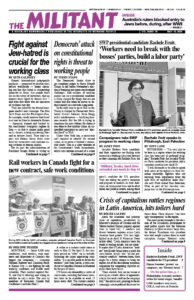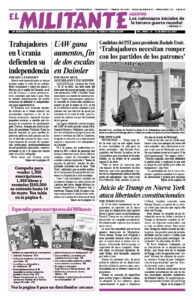May 17, 1999
SEATTLE — Luis Morejón and Itamys García, two Cuban youth leaders, came to Seattle as part of their six-week U.S. speaking tour, and some 360 people in several meetings heard them speak about the Cuban revolution today. Both are members of the Union of Young Communists.
One meeting was a weekly Chicano-Mexicano-Latino class at El Centro de la Raza. They were asked what has been the role of different generations of young Cubans. Moréjon said the generation of youth at the beginning of the revolution faced the challenge of carrying out a massive literacy drive to teach every Cuban to read and write, and to defend Cuba from U.S. invasion and other aggression. Now young Cubans confront the challenges of continuing to build a socialist society in the face of the U.S. embargo and to draw youth into leading the revolution in all areas.
May 17, 1974
The government’s “wage-price” controls expired April 30. When they were set up in 1971, the administration promised a fair deal to all and success in the “war against inflation.” But listen to Arnold Weber, former head of the Cost of Living Council, explain the real intention: “The idea of the freeze and Phase II was to zap labor, and we did.”
The disastrous experience of “wage-price” controls holds a vital lesson for the labor movement. Millions of working people have had a firsthand experience in the futility of relying on the government to control prices. At the same time, the growing popularity of wage escalator clauses points to a tendency to rely on labor’s own strength.
To successfully defend the standard of living, the union movement will have to end the policy of cooperating with government wage-control schemes in any guise.
May 16, 1949
DETROIT — By this time the whole world knows that 62,000 workers at the Ford River Rouge plant and 3,200 workers at the Lincoln plant are on strike. The whole Ford empire is shut down. The simple issue is the speedup.
The problem was posed sharply over a year ago in the major corporations. The campaign to squeeze more work out of the auto workers was accelerated with the model change-over and the narrowing of the market for automobiles. The Ford workers are now on the battling line and intend to put labor-management relations on an entirely new basis before they return to manufacture more cars.
Already there is evident a noticeable increase of militancy on the part of many auto workers. In the past week the Briggs workers staged a series of walkouts. Workers of the Chevrolet assembly plant in Flint voted to strike because of the speedup.

